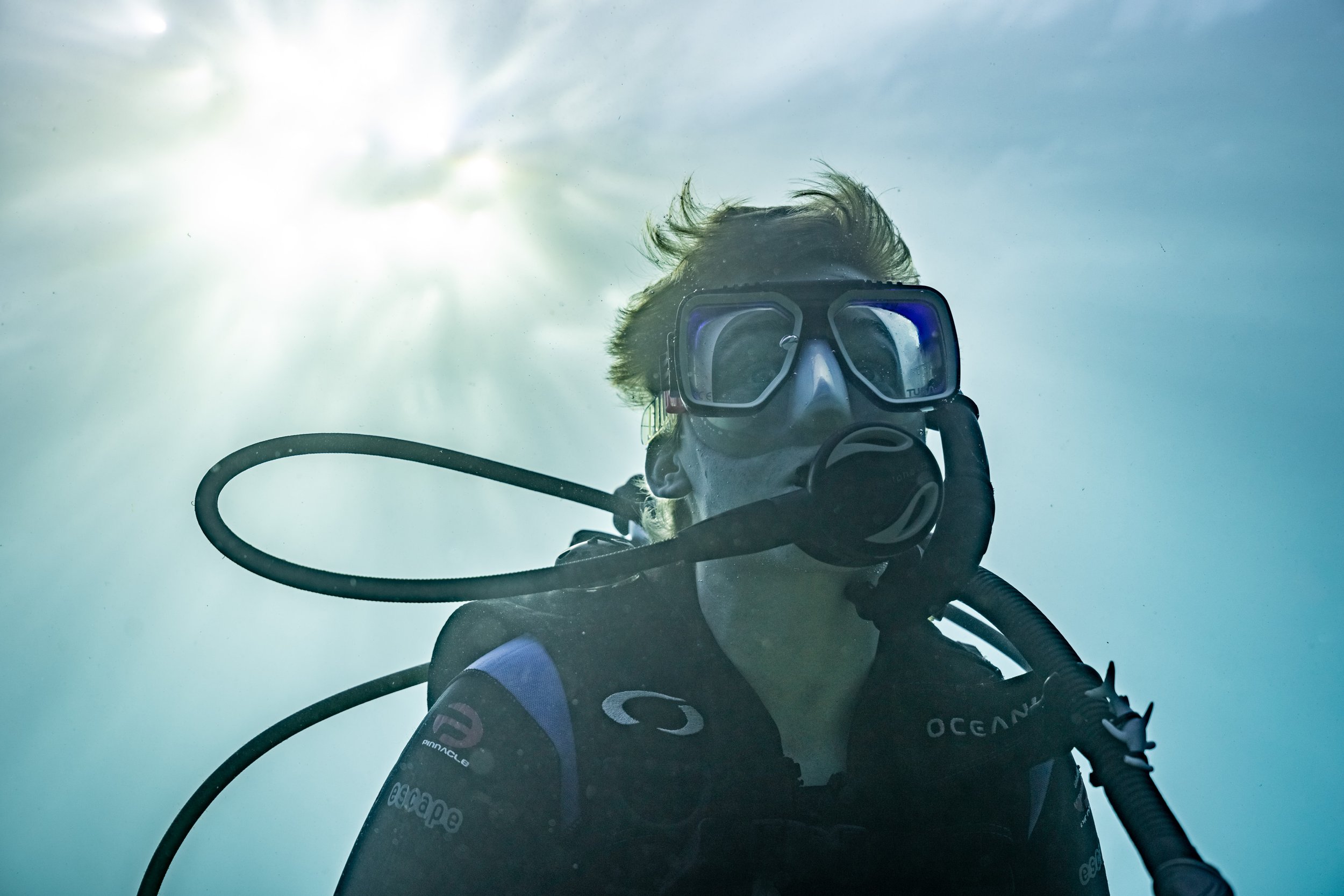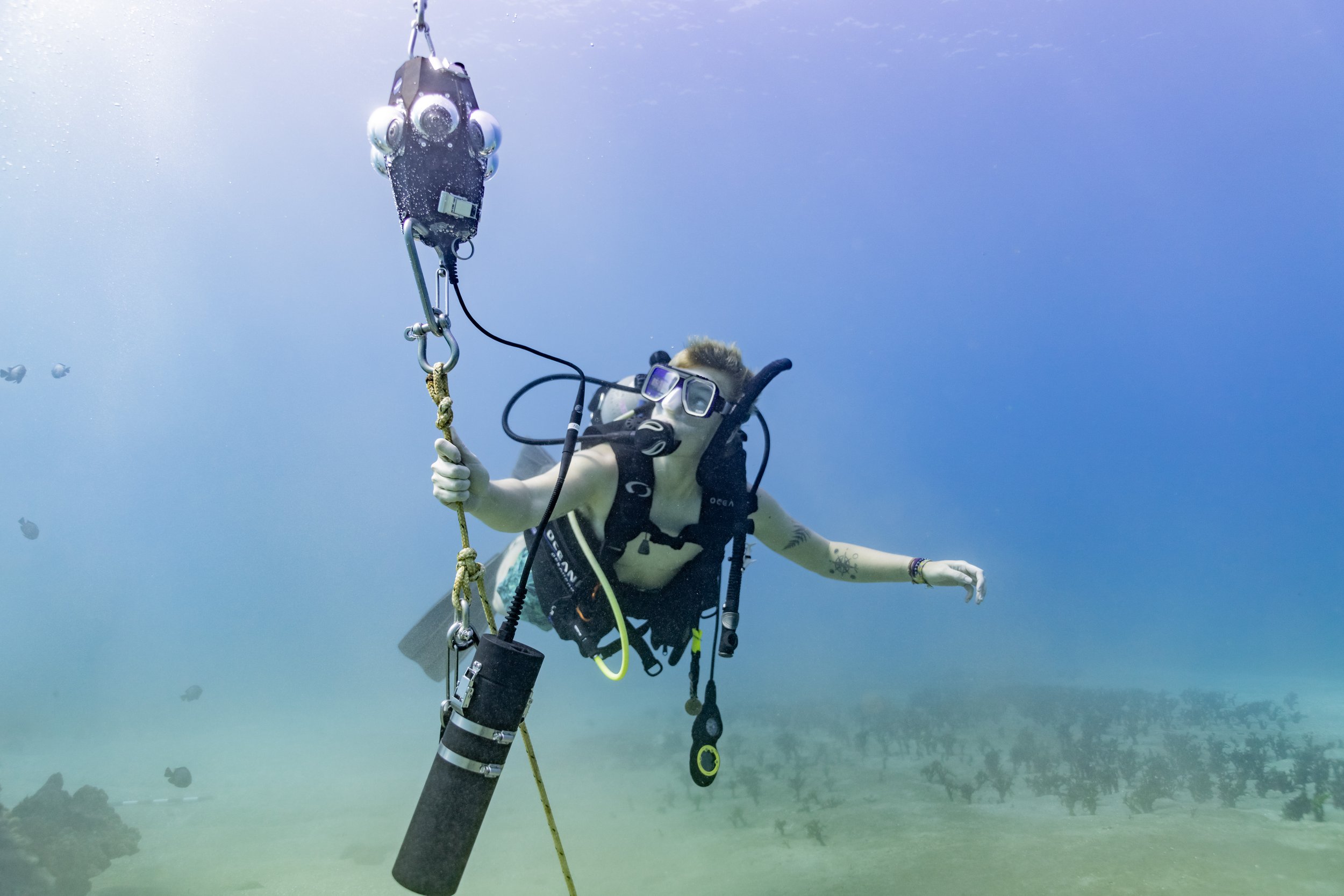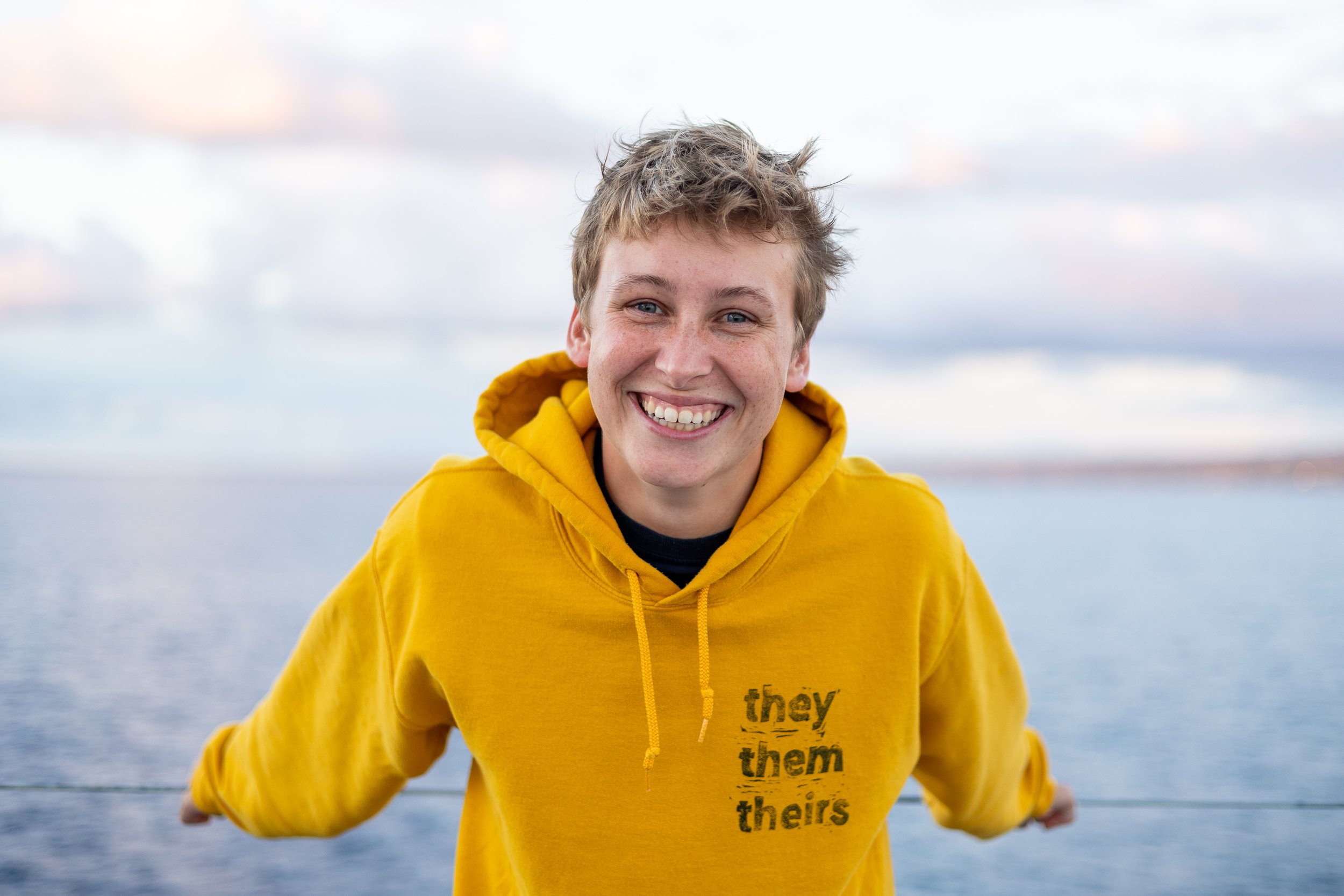Nova West is an award-winning filmmaker, artist, scuba diver, and conservationist. While Nova and I have both worked as video engineers and documentarians aboard E/V Nautilus for the past few years, this fall was the first time we had the opportunity to sail together.
Working alongside Nova every day for the past six weeks has been one of the best experiences I’ve ever had on a ship, both professionally and personally. Nova’s prolific creativity, tenacious work ethic, and buoyant spirit light up our little world on Nautilus every single day. The things Nova and I talk about – from pursuing full-time freelance careers to being a good shipmate to advocating for the queer community – fill my heart and stimulate my mind.
When I asked if they would be willing to do a Q&A interview for my blog, Nova’s response epitomized their radiant energy — an immediate, emphatic “yes!”
Please enjoy getting to know this remarkable human.
Welcome to our office: Nova wrangles our Mantis 360 underwater camera housing during a dive near Maui.
Alright, let’s pretend like we haven’t spent the better part of two months living and working together in a small, confined space — introduce yourself please! Tell me a little bit about who you are and what feeds your soul.
My name is Nova West. I use they/them pronouns. I am a video engineer and expedition documentarian on board E/V Nautilus. When I’m not working here, I am a wildlife filmmaker specializing in underwater cinematography.
So that’s my typical, professional spiel on the ship. Here’s a slightly more authentic description:
My name is Nova West. I use they/them pronouns. I am your local bog gremlin. I love all things ocean. I love all things creative. I love using art and science to challenge my perspectives and perceptions of the world.
My closest friends describe me as a chaotic sea creature from the dawn of time who contains both deep wisdom and childlike enthusiasm.
You were born and raised in Minnesota. When and how did you fall in love with the ocean?
The first time I saw the ocean was during a family vacation in fourth grade. I hated everything about it. The waves scared me, and I thought the salt water tasted terrible. Growing up in Minnesota, I was accustomed to the predictability lake water.
I didn’t see the ocean again until I moved to Washington D.C. right after college, but even then it was mostly Ocean City, Maryland and the Chesapeake Bay — which doesn’t really count as “the ocean”.
The more fundamental thing I’ve always enjoyed is being in water. When I was kid, I swam all the time and my family always struggled to get me to leave the water. When I hit puberty, however, I stopped swimming altogether. I felt betrayed by my body. I spent a solid 5 years hardly touching the water; hardly coming home.
After I graduated from college, everything fell into place at the same time. I moved away from my home state, started working at National Geographic, and had expendable income for the first time in my life. I finally had the means to make my physical transition happen. Not every trans person needs to physically alter their body, but I did - it was life-saving. After meeting the new me, I fell in love with my new home. It felt like my body was finally mine — especially in the ocean. There is something very healing about the ocean and the way it holds our bodies.
No gear? No problem. Even without a mask, snorkel, or fins, Nova is right at home in the open ocean.
Working for National Geographic sounds like a dream job to a lot of people. What was your experience like there?
I worked at National Geographic headquarters on and off for about four years. I was an editor, so I sat in a cubicle and stared at screens all day. Anyone who knows me knows how gut-wrenching that part of the job was for me. I often describe myself as a creature who does not do well in a box - socially, physically, emotionally. In order to work in a confined space I had to find other means of adventure in my free time, whether that was learning to scuba dive or completing my first 200ft multi-pitch trad climb.
I’m forever grateful for that position though, because it was a critical stepping-stone to where I am now. I’ve watched hundreds of thousands of hours of interviews and natural history footage, and I learned most of what I know about filming because I spent years watching incredible work from some of the world’s best filmmakers.
Radiating joy every day. Nova smiles while working on the Moonshine dive boat off the coast of the Big Island.
When and how did you make the decision to leave National Geographic and become an independent photographer/filmmaker?
The National Geographic headquarters in D.C. consists of two buildings connected by a tunnel. The walls of that tunnel are decorated with huge photos of underwater explorers, photographers, and conservationists (people like Sylvia Earle) who do really incredible work for our oceans. I must have walked through that tunnel hundreds of times. Suddenly one day out of the blue, as I was walking through it yet again, I thought, “I want to be one of those people. I want to see people like me doing this work.”
Then I spent my last year at Nat Geo trying to figure out how the hell I could make it happen.
And you did! You made it happen! How did National Geographic connect you to E/V Nautilus and the Ocean Exploration Trust?
During my final year at National Geographic, I learned about a project called Expedition Amelia. It was Bob Ballard’s first attempt to find Amelia Earhart’s lost plane and would include spending two weeks circumnavigating the island of Nikumaroro in the South Pacific.
The entire project was going to be filmed by National Geographic, rather than being outsourced to another production company. For me, it was the perfect combination of honing in on my filmmaking skillsets and knowing the right people at the right time. During my time there, I co-founded Nat Geo Pride, which allowed me to get to know people who ultimately connected me with the Expedition Amelia project.
It wasn’t just my first time joining an expedition team. I had never even left the country before. I didn’t have a passport. The 11-hour trans-Pacific flight to Fiji was the longest flight I had ever been on.
A natural explorer: Nova works as an observer during drone operations aboard E/V Nautilus on October 20th, 2022.
Working (and living in general) as an openly trans and non-binary person comes with an abundance of challenges and concerns regarding personal safety. Can you tell me a little bit about how you navigate through that volatile terrain?
For more than 80 percent of the jobs I take, I have to leave my trans self at the door and pretend like I’m a small man. When I’m away from home I don’t know if who I’m working with is safe, and I have no immediate community to support me. The level of concern I have for my personal safety comes from experience, not from an abundance of caution. It’s a reality.
Before I travel anywhere, I always research the destination, including its legal policies and cultural climate towards queer people. Before we boarded the E/V Nautilus for Expedition Amelia, we spent a few days in Samoa, which I didn’t know at the time that it’s a pretty severely homophobic country. In many countries it is illegal to be queer or trans – but those kinds of laws don’t deter me from going. And I think that’s an important thing to highlight for producers and directors who organize film crews. The solution is not to remove the queer person from the shoot — it’s to work with them to find ways to ensure their safety.
“I’m very vocal about my queerness because I want to create more visibility for people like me. I want other trans and non-binary people to be able to see who they can become.”
What has your experience been like working on E/V Nautilus?
I truly love working on Nautilus. It’s the one workplace where I’ve felt the most seen in my entirety. There are so many types of people here, with so many backgrounds and expressions, which helps me feel comfortable being my entire self. I like referring to us as the island of misfit toys; we’re all not afraid to be ourselves.
Sometimes shipmates become family: Nova, Justin Lowe, and I enjoyed many afternoon coffees together during three back-to-back expeditions aboard Nautilus this season.
We have the best job: Every day spent on a boat or in the water with Nova is a good day. Here, we take a quick selfie during an epic day aboard the Extended Horizons dive boat.
In addition to bringing my queerness on board, I also love that Nautilus is a learning vessel. It’s empowering to enter a space where I can ask questions and learn on the job. I don’t have to come in ready to go, knowing everything. Bringing my own learning style, and not just following a standardized learning method, helps with envisioning yourself in the space.
You’re only 27-years-old and you have already accomplished so much. What fuels your drive and motivation to succeed?
Honestly, a lot of my energy is derived from pure spite. It sounds intense, but it starts super close to home with my queerness — my family was not very accepting of me or my older brother when we both came out as trans.
I’ve been out for almost ten years, and using the name “Nova” for seven years. My immediate family has come a long way during that time. They call me by name now, and sometimes they use my correct pronouns.
Entering into adulthood as an out trans person, I was angered about not being accepted by my family and not having any positive role models to help me see that who I am isn’t a negative trait. I’m now very vocal about my queerness because I want to create more visibility for people like me. I want other trans and non-binary people to be able to see who they can become.
Yeah, we’ve talked a bit about biological family versus logical family. Can you tell me more about the steadfast sources of love and support in your life?
I’ve been fortunate to have so many people along the way who saw my excitement and skillsets and my willingness and curiosity to learn, and lifted that up. They saw the spark. I would be nowhere without people who believed in everything I could become.
I’ve tried to be really diligent about saying yes to every opportunity. That mentality can lead you to the wildest places with the coolest people, but sometimes it doesn’t work out. Sometimes the people or the dynamics are off. But it’s just like science — if you don’t fail, you’re not going to learn things.
What are your goals for the future?
I want to become the first out trans National Geographic explorer. I want to create documentaries that tell the stories of my queer community and empower other marginalized communities to tell theirs. I would love to have my own production company one day that can create films about natural history and culture, but I also want to ensure the company itself embodies a work culture of acceptance where people of marginalized backgrounds are not just brought on as tokens, but brought in as their whole selves.
Oh, and if there were about five copies of me, I’d love to open a dive shop that acts both as an educational and gathering space for marginalized people passionate about the ocean. I want to create non-gendered gear. Wetsuits that fit all bodies. A diving community who deeply sees and embraces everyone who chooses to be there.
Even when I’m 87, I hope I’m still learning new things. And going to sea.
What advice would you give to young people?
The world will always give you so many reasons to not go after your dreams. You should still allow yourself to dream as big as you possibly can, and know that you don’t have to have all the answers yet. I firmly believe in the saying shoot for the moon — even if you miss, you’ll land among the stars.
Remain curious and open to opportunities — that’s how I ended up on a research vessel in the middle of the ocean, searching for Amelia Earhart’s plane. Don’t be afraid to reach out to strangers. Send a message to that person on Instagram who is doing what you dream of doing. That’s how I met my best friend who is co-producing my documentary, and now we have plans to tell some pretty impactful stories together.
Don’t count yourself out. Stay you, but never stop growing.
Here’s to them! I am so, so happy to know this gorgeous human. Thank you for allowing me to share some of your story here Nova!
Learn more about Nova and peruse their incredible work at novawestcreative.com. Follow them on Instagram at @novawestcreative.








